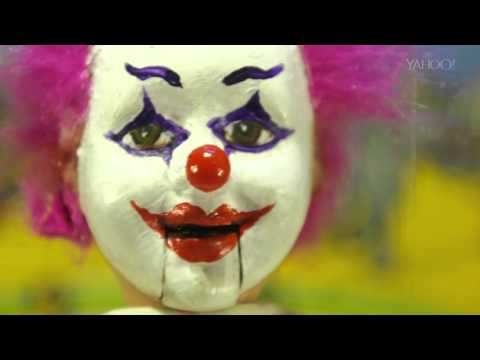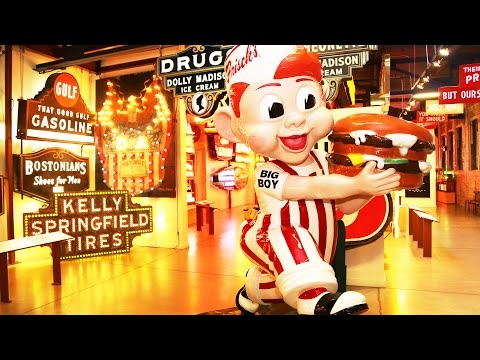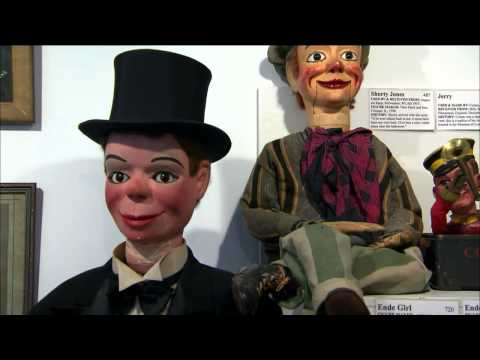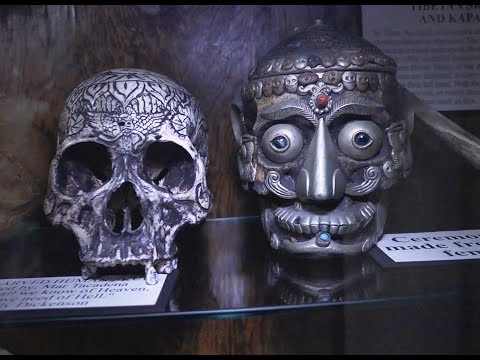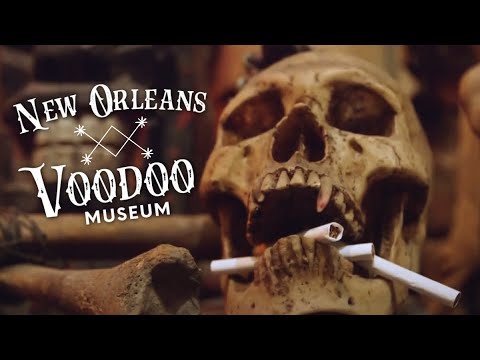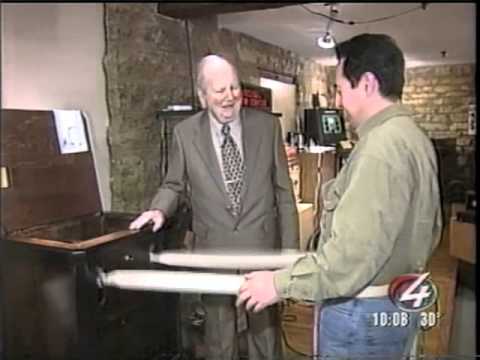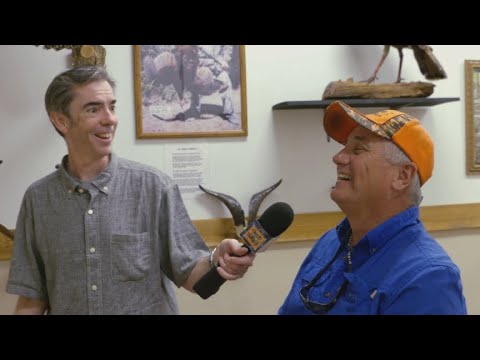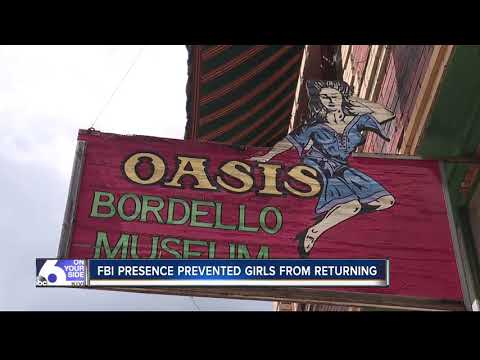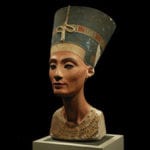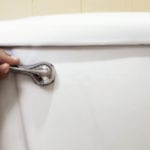Today we’re going to take a look at 10 of these uniquely American institutions that have documented the bizarre and the unusual, providing museum experiences like no other.
10 Abita Mystery House
Located in Abita Springs, Louisiana, not far from New Orleans, the Abita Mystery House’s mission is to take the old saying “one man’s trash is another man’s treasure” and turn it into a museum of distinctly American throwaway items. Founder John Preble got the idea for the Mystery House during rock collecting trips. He would find not only rocks but also “bottles, bottle caps, license plates, springs, motors, pottery shards, and ‘what all.’” Watch this video on YouTube The museum has since grown to feature several odd collections, memorabilia, and old arcade games. And fittingly for Louisiana, there are several alligator-themed exhibits. If you can’t make it to the New Orleans area anytime soon to see the oddities in person, several YouTubers have documented the unique experience of visiting the Abita Mystery House.[1]
9 American Sign Museum
The American Sign Museum in Cincinnati, Ohio, offers 20,000 square feet of indoor space dedicated to signs and the history of sign making. Their website claims that they have the largest such exhibit in the United States. From the familiar red neon “MOTEL” sign to early McDonald’s storefront signage, all types of signs are represented in the museum’s collection. Besides being a highly entertaining look at something we take for granted in everyday life, it’s also educational. The tour is self-guided, as audio you listen to on your smartphone gives context to the exhibits while also explaining the skill and artistry involved in crafting such memorable signs. You can even host your own events there, which would surely make for one of the most unique birthday parties ever.[2]
8 Vent Haven Museum
Did that episode of the Twilight Zone featuring a sentient ventriloquist’s dummy creep you out? You might want to keep that in mind before visiting the Vent Haven Museum in Fort Mitchell, Kentucky. Billed as the world’s only museum dedicated to ventriloquism, your enjoyment of this museum will ultimately depend on whether you’re comfortable with hundreds of dummies staring at you. Watch this video on YouTube Over a period of 40 years, founder W.S. Berger amassed a collection of everything related to ventriloquism, including dummies, puppets, photos, scripts, posters, and other memorabilia. Since the dead-eyed stare of dummies does unnerve many people, it’s not surprising that some claim that the place is haunted, with one reviewer labeling it “the creepiest museum in the world.”[3]
7 The Museum of Death
If ventriloquism dummies are no big deal to you, then something darker and a little more realistic might be in order—The Museum of Death. With locations in both Hollywood, California, and New Orleans, Louisiana, the Museum of Death houses the world’s most extensive collection of “serial killer artwork, antique funeral ephemera, and morticians’ and coroners’ instruments,” according to their website. Be forewarned before visiting this museum—this exhibit has not been watered down to make it family friendly. Reports from past visitors list some of the gruesome exhibits: actual photos of the Charles Manson and Black Dahlia crime scenes, morgue photos, the guillotined severed head of the Blue Beard of Paris (Henri Landru), and videos of both real deaths and autopsies. While it won’t be for everyone, you have to admire the Museum of Death locations for their commitment to their theme.[4]
6 Leila’s Hair Museum
Located in the Kansas City suburb of Independence, Missouri, Leila’s Hair Museum claims to be the only one of its kind in the world. And that seems totally believable. In 1956, museum founder and cosmetology school owner Leila Cohoon was visiting an antique dealer and discovered a 6″ by 6″ gold frame with a wreath of human hair in it. That kick-started a hobby that led to her eventually starting up her namesake hair museum. What exactly is hair art? The category includes a wide variety of objects made from human hair, including wreaths, bouquets, and jewelry. Hair art actually has a long history, peaking in popularity in the 19th century. In a time before widespread photography, saving the hair of family and friends and then making art out of it was seen as a way to remember the deceased. It’s also a way to record different hairstyles over the years. Leila’s Hair Museum has been credited with reviving interest in the art form.[5]
5 The Museum You Can’t Visit
The initials CIA are familiar to most, as they stand for the Central Intelligence Agency. The CIA Museum is located at the CIA headquarters in Langley, Virginia, and, as such, is not open to the public. But the museum does collect over 3,500 declassified artifacts that are available to view online or can be sent out for public exhibits elsewhere. The museum was the brainchild of former CIA Executive Director William E. Colby. In 1972, Colby had the idea to share “a very selective accumulation of truly unique items.” Among those items are the spy gadgets, weapons, and espionage memorabilia that one might expect from the intriguing world of international spies. So unless you’ve got the high-level government clearance required to set foot in the CIA, you won’t be making a visit to see this fascinating collection in person. Still, you can always check out the current list of exhibits on the museum’s website.[6]
4 New Orleans Historic Voodoo Museum
Technically speaking, Voodoo is a term often used to refer to many different religions and cultural practices, but there’s no doubt that New Orleans is the city most associated with it. The New Orleans Historic Voodoo Museum attempts to demystify things with this mission statement: “We take all the mysteries, the secrets, the history, and the folklores of rituals, zombies, of gris-gris, of Voodoo Queens and all that jazz, and put it all in one place at the heart of the New Orleans French Quarter.” A visit to the museum will help you understand how Voodoo made its way to New Orleans via the 18th-century slave trade and how it then merged with Catholic concepts to create the unique blend that is New Orleans Voodoo. It may seem like a scary topic to explore, but the focus is more educational than sensational. The museum does offer haunted cemetery walking tours, though, if that sounds like something you’d like to participate in.[7]
3 Museum of Questionable Medical Devices
The Museum of Questionable Medical Devices in St. Paul, Minnesota, officially closed in 2002. But the name alone is enough to tell you this is a special collection still worth exhibiting, so the Science Museum of Minnesota picked it up as an exhibit. That makes it somewhat of a museum within a museum. The items on display range from devices of dubious functionality to the downright dangerous. On the innocuous end of the spectrum is a phrenology reader that was purported to read personalities and give reports on traits such as intelligence and morality. That’s questionable but harmless, but the same can’t be said for a depilatory machine that removed unwanted hair with x-rays and ultimately caused cancer in thousands of patients. The museum features many other examples of medical quackery, making for a fascinating look at how humans attempted to cure their foibles over the years. If nothing else, it will make you grateful for living in a time of more advanced medical science.[8]
2 The Spear Hunting Museum
If you live in an area where hunting is popular, you’re familiar with the various seasons for bow-and-arrow and rifle hunting. But do you remember the last time it was spear hunting season? If you find yourself in Summerdale, Alabama, you can learn all about the sport in the only museum on this list to honor one single person. Billing itself as “Home of the greatest spear hunter in recorded history, Gene Morris,” the Spear Hunting Museum is a one-of-a-kind experience. Morris recorded 592 big game kills, which is all the more impressive considering that he didn’t even start spear hunting until the age of 40. While the focus is on Morris and his exploits, a visit to the museum does provide a good education on spear hunting itself, along with information about big African game like lions, zebras, and wildebeests.[9]
1 Oasis Bordello Museum
The Oasis Bordello Museum in Wallace, Idaho, has one of the best origin stories of any museum in operation. In 1988, the building that currently houses the museum was an active house of ill repute when the occupants quickly packed up and left, leaving everything behind. And that really means everything, including all personal items, furniture and furnishings, food in the cupboards, and even groceries fresh from the store, still in a bag. The operation’s madam sold the building to a local businessman in 1993, and the museum was born. Things are exactly as how they were when the occupants fled in 1988 (a tip came in that the FBI were headed to town). If a museum’s purpose is to preserve history, we’re not likely to find one that does a better job than the Oasis Bordello Museum, which was literally frozen in time. And perhaps the most fascinating aspect is just how recent that time was, given that the story of the madam and her ladies on the run sounds like a story out of the 1800s American West.[10]
